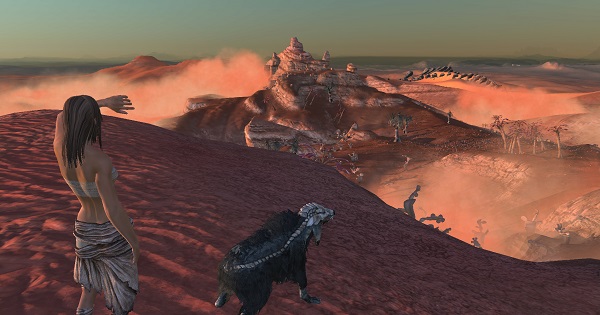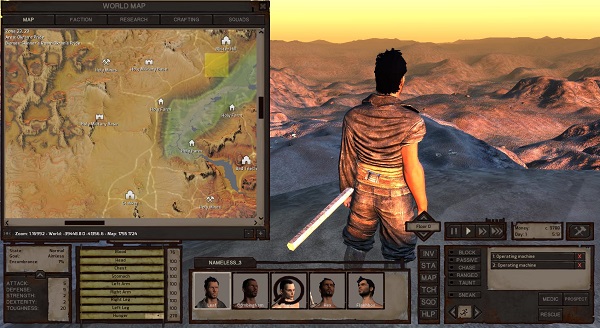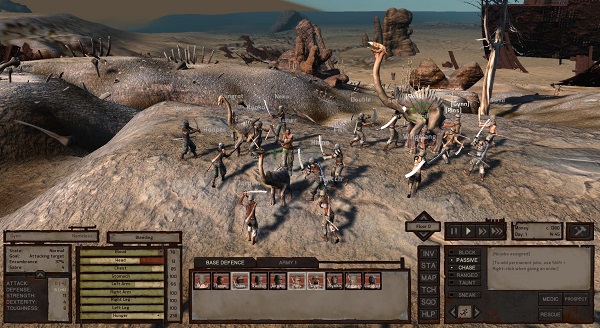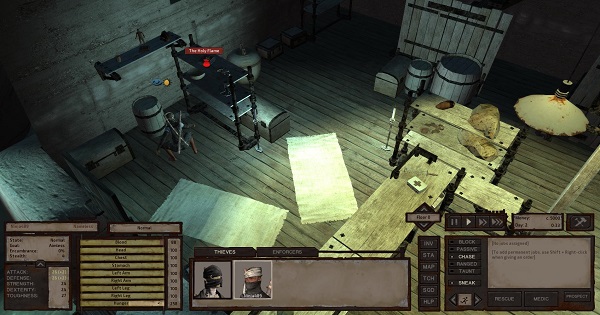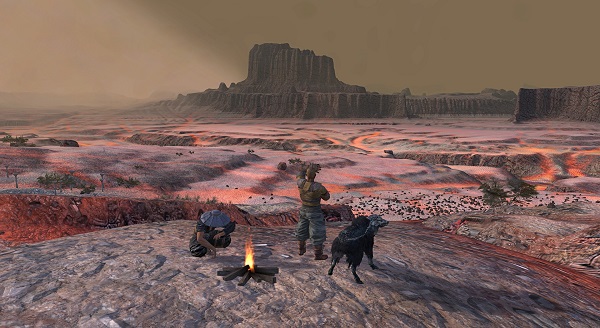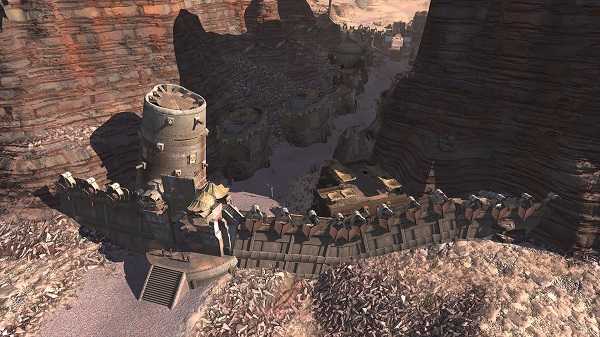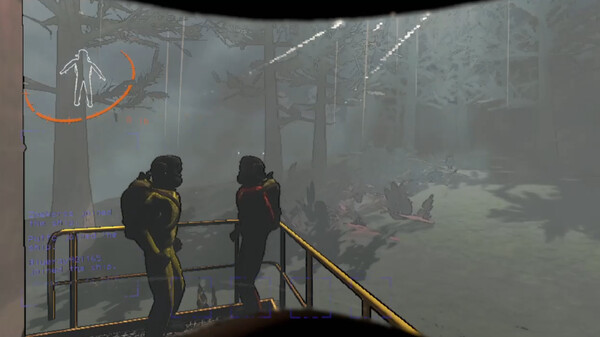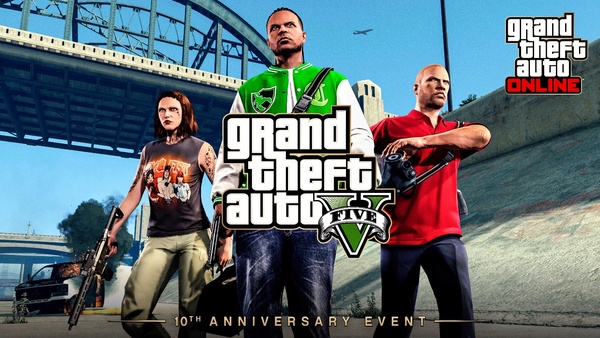Kenshi is a unique open-world, squad-based RPG developed by Lo-Fi Games, offering players an unparalleled sandbox experience in a brutal, post-apocalyptic wasteland. Unlike traditional RPGs,
Kenshi throws players into a world with no predetermined narrative, allowing complete freedom to forge their own path—be it as a trader, thief, warlord, or even a slave. This article delves into the intricacies of the
Kenshi game download, provides an in-depth
Kenshi review, and explores why this indie gem has captivated players worldwide despite its challenging mechanics and unforgiving nature.
The Genesis of Kenshi: A 12-Year Journey
Kenshi began as a passion project by Chris Hunt, the founder of Lo-Fi Games, who started development around 2006–2008. Initially working alone while moonlighting as a security guard, Hunt poured his vision into creating a game that defied conventional gaming tropes. He aimed to craft a world where players are not the "chosen one" but rather ordinary individuals struggling to survive. This vision culminated in
Kenshi’s release into Steam’s Early Access in 2013, with the full version launching on December 6, 2018, after nearly 12 years of development.
The game’s prolonged development cycle allowed for a deeply detailed world, but it also came with challenges. Early versions were plagued by bugs and performance issues, reflecting the limitations of a small team. However, the dedication of Lo-Fi Games and community feedback transformed
Kenshi into a cult classic, selling over 2.3 million copies by April 2024. The game’s raw, unpolished charm is part of its appeal, offering a unique experience that continues to draw players seeking a hardcore survival challenge.
What is Kenshi? A Genre-Defying Sandbox RPG
Defining Kenshi’s Gameplay
Kenshi is a free-roaming, squad-based RPG with real-time strategy elements, set in a vast 870-square-kilometer post-apocalyptic world. Unlike most RPGs, it lacks a linear story, giving players the freedom to choose their role—whether it’s a
trader,
thief,
rebel, or
warlord. The game blends survival, crafting, base-building, and role-playing elements, creating a hybrid experience that’s difficult to categorize. Players start as weak nobodies, with no special abilities, and must navigate a harsh world filled with cannibals, bandits, and slavers.
A World of Choices
The absence of a scripted narrative means every decision shapes your story. You can mine resources to earn money, steal from shops, build a fortified outpost, or join factions to influence the world’s dynamics. The game’s open-ended nature allows for creative playstyles, from running a trading empire to becoming a nomadic warrior. However, this freedom comes with a steep learning curve, as
Kenshi offers minimal hand-holding, making early gameplay punishing yet rewarding.
System Requirements and Installation Tips
Kenshi requires a 64-bit Windows system (7/8/10), a dual-core 64-bit processor, 6 GB RAM, and 14 GB of storage. While the game runs on modest hardware, an SSD is recommended to reduce long loading times, especially when exploring new zones. Installation is straightforward, but players should ensure their graphics card supports Pixel Shader 5.0. Be prepared for occasional crashes or bugs, particularly on older systems, though community patches and mods can enhance stability.
- Minimum Requirements: Windows 7/8/10 (64-bit), Dual-core 64-bit CPU, 6 GB RAM, 14 GB HD space.
- Recommended: SSD for faster loading, 16 GB RAM for smoother performance with mods.
- Pro Tip: Save frequently and avoid maxing game speed during zone transitions to prevent crashes.
First Impressions: The Brutal Learning Curve
Starting as a Nobody
Upon launching
Kenshi, players are thrust into a harsh world with no guidance beyond basic tutorials. Your starting character is weak, often losing to even the lowliest
Starving Bandits. Early gameplay involves grinding tasks like mining copper or iron to afford food, all while dodging threats like bandits or wild beasts. This unforgiving start can be daunting, but it’s designed to emphasize survival and growth through perseverance.
Overcoming Initial Challenges
The lack of hand-holding forces players to learn through trial and error. For example, getting beaten up increases your toughness stat, making future fights easier. Recruiting companions early can help, but managing a squad adds complexity, as you must balance food, equipment, and injuries. The game’s realistic medical system—where limb injuries affect movement and combat—adds depth but also frustration for newcomers. Patience is key to mastering
Kenshi’s mechanics.
Gameplay Mechanics: Depth and Complexity
Skill Progression and Combat
Kenshi’s skill system is action-based, meaning skills like thievery, combat, or crafting improve through use. For instance, stealing items levels up your thievery, while fighting hones combat skills. The combat system is real-time with pause, allowing tactical control over your squad. Injuries are detailed—limbs can be severed, requiring prosthetics—and healing takes time, adding realism. This system rewards strategic planning but punishes recklessness.
Base-Building and Faction Dynamics
Players can build outposts, from small farms to fortified cities, but this requires researching technologies and gathering resources.
Base-building is a core feature, allowing automation of tasks like farming or crafting, but it attracts raids from factions like the
Holy Nation or
United Cities. Your choices—allying with or opposing factions—impact the world, with events like faction leaders’ deaths triggering new locations or power shifts.
- Key Mechanics: Action-based skill progression, real-time squad combat, base-building with automation.
- Faction Tips: Research faction relations before building to avoid constant raids.
- Challenges: Resource scarcity and frequent attacks make base management intense.
The World of Kenshi: A Post-Apocalyptic Masterpiece
A Vast, Living World
Kenshi’s 870-square-kilometer map is one of the largest in single-player RPGs, rivaling classics like
Daggerfall. The world features diverse biomes, from desolate wastelands to lush forests, each with unique resources, weather (like acid rain), and threats. The game’s “world states” system ensures dynamic reactions, such as towns changing hands when key figures die, creating a living, breathing environment.
Lore and Atmosphere
While
Kenshi lacks a central narrative, its lore is rich, pieced together through exploration and interactions. The world’s
post-apocalyptic setting, blending sword-punk and steampunk elements, feels alive, with NPCs operating independently. The atmosphere is oppressive, emphasizing that you’re just another survivor in a cruel world. This detachment fosters immersion, encouraging players to craft their own stories, from humble beginnings to empire-building.
Modding: Expanding Kenshi’s Possibilities
A Thriving Modding Community
Kenshi boasts over 1,500 fan-made mods on
Steam Workshop, ranging from quality-of-life improvements to complete overhauls. Mods enhance visuals, add new factions, weapons, or gameplay mechanics, and even improve the interface for better usability. For example, mods like
Expanded Construction introduce new buildings, while others rebalance combat or add detailed maps. This modding potential ensures every playthrough feels fresh.
Popular Mods to Enhance Your Experience
- Reactive World: Enhances faction interactions and world events for deeper immersion.
- Nice Map: Adds detailed, translucent maps for better navigation.
- Animation Overhauls: Improves combat animations for a more dynamic experience.
Mods are easy to install via
Steam Workshop, but players should ensure compatibility, as some mods may conflict or require specific load orders. Modding transforms
Kenshi into a personalized experience, catering to diverse playstyles.
Critical Reception: A Polarizing Yet Beloved Game
Praise for Depth and Freedom
Kenshi has garnered widespread acclaim, with a 95% positive rating from 83,197
Steam reviews and a Metacritic score of “generally favorable.” Critics praise its depth, comparing it to
Dwarf Fortress and
Ultima Online for its open-ended gameplay. Rock Paper Shotgun called it a game that “impresses the bejeesus,” while PC Gamer noted its “frightening depth” despite technical flaws. Players love the freedom to create their own stories, from nomadic adventures to building empires.
Criticisms and Technical Issues
Despite its strengths,
Kenshi isn’t flawless. Critics and players cite dated graphics, poor optimization, and a clunky interface as drawbacks. Long load times, especially on HDDs, and occasional crashes frustrate some players. The steep learning curve and lack of guidance deter those accustomed to structured narratives. However, for many, these flaws are outweighed by the game’s unique charm and replayability.
Why Kenshi Stands Out: A Game for Storytellers
A Game for Creative Minds
Kenshi appeals to players who enjoy crafting their own narratives. As Michael Baker from
Grimdark Magazine noted, it’s ideal for writers and worldbuilders, forcing players to create their own goals in a reactive world. Whether you’re scavenging ruins, smuggling hash, or waging war, every playthrough generates unique stories. This freedom, combined with the game’s harsh consequences, makes every achievement feel earned.
Comparisons to Other Games
Unlike
RimWorld or
Fallout,
Kenshi prioritizes atmosphere over polished mechanics. Its blend of
RPG,
RTS, and
survival elements sets it apart, offering a raw, unfiltered experience. While
RimWorld provides similar colony management,
Kenshi’s open world and lack of scripted objectives create a distinct sense of wanderlust and freedom. For fans of hardcore survival or role-playing,
Kenshi is unmatched.
Kenshi 2 and the Future of the Franchise
What’s Next for Kenshi?
Lo-Fi Games is developing
Kenshi 2, a prequel set 1,000 years before the original, promising a refined experience with improved graphics and mechanics. While details remain scarce, a 2024 video featuring Chris Hunt and Nat Mikkelson hinted at maintaining the core philosophy of player-driven storytelling. Fans hope for quality-of-life improvements, such as better inventory management and optimization, while preserving
Kenshi’s unique vibe.
Community Expectations
The
Kenshi community is eager for
Kenshi 2, with discussions on platforms like
Reddit highlighting desires for less clunky controls and enhanced modding support. Players also anticipate deeper lore exploration, given the sequel’s earlier timeline. With
Kenshi’s sales success and loyal fanbase, expectations are high, but Lo-Fi Games’ small team suggests a patient wait for a polished release.
Conclusion: Is Kenshi Worth Your Time?
Kenshi is not for everyone, but for those who embrace its challenges, it offers an unparalleled sandbox experience. Its vast, unforgiving world, combined with total freedom and modding potential, makes it a standout in the RPG genre. The
Kenshi game download is easily accessible on platforms like
Steam and
GOG, with frequent sales making it an affordable entry into a world of endless possibilities. Despite technical flaws and a steep learning curve,
Kenshi’s depth and replayability earn it a 9/10 in this
Kenshi review. If you’re a fan of survival, role-playing, or colony management games,
Kenshi is a must-play that will test your creativity and resilience.
Summary (160 characters):
Kenshi is a brutal, open-world RPG with unmatched freedom. Download on Steam/GOG, expect a tough but rewarding experience. 9/10 for depth and replayability.
